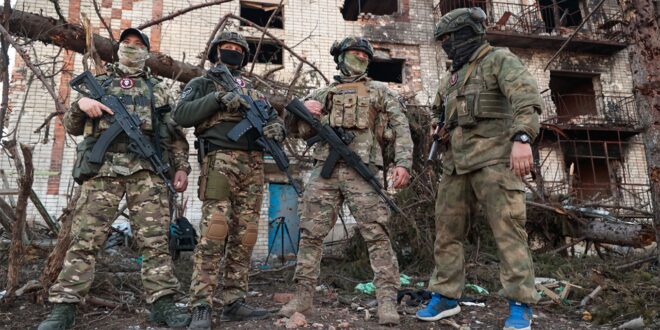The family of Tanzanian-born Nemes Raymond Taremo first heard rumors that their beloved relative had been killed on the frontlines in faraway Ukraine in December last year.
They received their last message from Taremo, 37, two months earlier — on Oct. 17 — shortly after he joined Russia’s Wagner mercenary group from a Russian prison where he was serving a sentence on drug charges.
Weeks later, he would be dead, killed in fighting as Wagner waged a brutal offensive in eastern Ukraine. But it wasn’t until January that Taremo’s family finally received the formal confirmation of his death.
“His body was brought back to Tanzania in February after we fought a lot for it, and even held protests at the Russian Embassy in Dar es Salaam,” Taremo’s cousin Rehema Maclean Kigobe told The Moscow Times.
“When we demanded more information from the Russian ambassador, they refused to address us and said it would ruin Russia’s relations with Tanzania.”
Taremo is one of likely hundreds of foreign mercenaries from the so-called Global South who have joined the Russian Armed Forces to fight in Ukraine since the Kremlin ordered tanks over the border into its pro-Western neighbor last year.
For some, like Taremo, the main motivation seems to have been money — or to escape a Russian prison. For others, the reasons are ideological.
Positive perceptions of Russia are much higher in some parts of Africa, Asia and South America compared with the U.S. or Europe, according to Ivan Kłyszcz, an expert at the International Center for Defense and Security in Tallinn, Estonia.
War-related disruption — particularly of food supplies — has caused hardship in some parts of the Global South, particularly Africa.
“I think the perception that people have is shaped by economic needs,” Kłyszcz told The Moscow Times. “Russia has been trying to convince people that… Ukraine’s resistance is causing inflation and problems with food supply.”
According to his family, Taremo came to Russia in 2017 to complete a master’s degree at a Moscow university, but was jailed on drug charges in 2021.
He may have joined Wagner, which offered him amnesty in exchange for six months of combat, as a way to get back to his home in Dar es Salaam, Kigobe said.
“He was promised his freedom, money and a comfortable life,” said Kigobe, adding that his cousin had no ideological reasons to join the conflict.
Similarly, Zambian student Lemekani Nathan Nyirenda was killed fighting for Wagner just a few weeks before Taremo. He was also recruited from a Russian prison.
At least 184 foreign men fighting for Russia have died in the 15 months since the start of the invasion, according to a casualty count maintained by independent Mediazona news website and the BBC Russian Service.
There is no official Russian data on foreign mercenary deaths.
While most foreign nationals in the Russian army appear to be from former Soviet republics in Central Asia — particularly Kyrgyzstan, Tajikistan and Uzbekistan — there are also soldiers from other parts of the Global South.
Some of these men from Africa, the Middle East and Southeast Asia believe that Russia is fighting a just war against Western-backed Ukraine.
Kavinda Wijerathna, an ex-soldier from Sri Lanka looking to join the Russian Armed Forces, told The Moscow Times that he thought Russia was the only power standing in the way of the West as it sought to face off against its opponents in the Global South.
He dismissed the evidence that Russia has repeatedly targeted civilian infrastructure in Ukraine.
“I will never believe that. They only target Ukrainian military and equipment,” he said.
The former marine said he approached Russia’s Embassy in Sri Lanka several months ago to receive instructions on how to enlist, but received no response.
Undeterred, Wijerathna, 44, is now planning to travel to Russia and try to enlist in person.
“I don’t know if the Russian army will give me a chance, but I want to do something for Russia. Maybe at least report the war from the Russian point [of view] via a YouTube channel,” he said.
Wijerathna denied that the prospect of receiving Russian citizenship — which foreign contract soldiers and their families can now receive after only one year of service — or the military salaries were among the reasons he wanted to join up.
“I want to do something for the Russian victory — that’s the reason. I like Russia’s leader, I like his leadership,” he told The Moscow Times.
However, the majority of mercenaries from the Global South appear to be lured to the war in Ukraine by the Kremlin’s promises of generous military salaries.
As many as 200 men lined up in front of the Russian embassy in the Ethiopian capital last April hoping to enlist in the Russian army and receive monthly payments of $2,000, Reuters reported.
And in November last year, the Middle East Eye reported as many as 500 Syrian soldiers were being deployed to aid Russia in Ukraine — though most of them were apparently due to be assigned non-combatant roles such as safeguarding facilities in occupied territories.
It was impossible to independently confirm the presence of foreign units fighting with the Russian Armed Forces in Ukraine.
Back in Tanzania, Nemes Taremo’s family are now left with no source of comfort — or even financial compensation for their loved one’s death.
“We don’t know anything about the agreement he entered into with Wagner,” said Taremo’s cousin Kigobe.
“Even though they are saying he is a hero, what has benefited us now that he is already dead?”
 Eurasia Press & News
Eurasia Press & News




